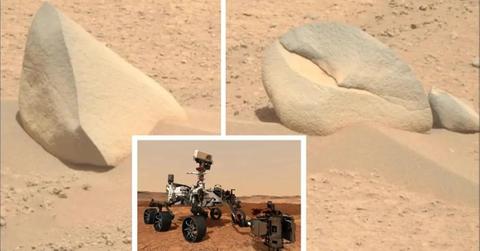Proof of Life? ‘Shark Fin’ and ‘Crab Claw’ Discovered on Mars

Life on Mars? New eerie discovery from NASA rover points that way!
NASA's Perseverance Rover recently discovered a pair of rocks on the surface of Mars that look like a shark fin and a crab claw.
The rover discovered the rocks while searching the Jezero Crater for signs of past life, which the vehicle has been doing since it landed on Mars in 2021.
Although the rocks appear convincing enough to be passed as the real fossilized remains of ancient animals on Mars, there have never been any proven signs of life on the red planet.
But it has been proven that the now barren surface of Mars overflowed with water billions of years ago, though there are no signs of marine life on the planet.
Instead, the images of the rocks have been written off as pareidolia.
Live Science defines pareidolia as "the brain's tendency to perceive a meaningful image from random visual data." It is the reason people often see meaningful shapes in clouds, like dogs or trees. There have been numerous instances where a person believed they caught something paranormal on their camera, while in reality, they have just been instances of pareidolia.
NASA shared the pictures of the rocks on Twitter with the caption, "This rocky duo was spotted hanging out together in a wind-swept area. I spy a…crab claw? Shark fin? Comment below with what you see!"
NASA's tweet resulted in multiple people commenting on what they saw in these images, most of them written in jest.
One user commented, "Definitely the holly remains of the (not so well known) 'Almighty Great Cosmic Crab,'" while another said, "Legends and ancestral myths told that He was the One who brought Life into our Galaxy." Interestingly, multiple commented that they saw "coffee beans" or "coffee grounds."
However, this is certainly not the first time the red planet has been subjected to this phenomenon, as one of the most historic instances of pareidolia is the "Face on Mars."
Never miss a story — sign up for the Front Page Detectives newsletter. Be on the scene the moment news breaks.
In July 1976, NASA's Viking 1 spacecraft revealed something extraordinary in the pictures it took of the Martian landscape. The spacecraft appeared to have apparently captured the sculpture of a human face on the surface of Mars, complete with eyes, a nose, and a mouth.
Although NASA shared the image with the public with the disclaimer that the face visible on the surface was nothing more than an illusion, the picture of "Face on Mars" made quite the ruckus. Many even believed that the "sculpture" was the work of sentient extraterrestrial beings.
The debate surrounding the apparently mysterious "Face on Mars" carried on well into the 1980s, and was even discussed in scientific conferences. In April 1998, NASA's Mars Global Surveyor (MGS) flew over the Cydonia region of Mars, where the supposed Face on Mars was located.
The MGS was successful in capturing images ten times sharper than those taken by the Viking 1 around 18 years ago, and the pictures showed the rock formation to be much more natural, with much of the "prominent" facial features having faded.
Become a Front Page Detective
Sign up to receive breaking
Front Page Detectives
news and exclusive investigations.
